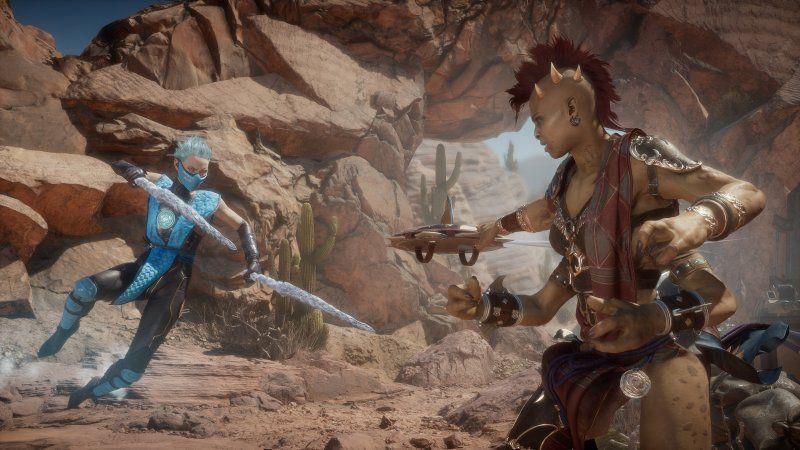The review of Mortal Kombat 11: Aftermath is very different from those normally dedicated to fighting DLCs, which are reduced to specials on a few extra characters, retouches to the balance or – in the best case scenario – to the entire combat system, with a few additional modes that barely justify the purchase price.
Aftermath, the newly released Mortal Kombat 11 expansion, is a much more difficult beast to tame, in line with the atypical characteristics of the fighter that serves as its base. The latest NetherRealm creature, on the other hand, is one of the few titles of this genre to have truly triple-A production values: a monstrous product from the point of view of content and technical sector, only minimally diminished by some unfortunate choices related to unlockable elements, and some pieces of the combat system that are for some fans rather irritating (albeit partly iconic).
In line with these characteristics, Aftermath therefore decides to focus on the campaign, often neglected or approached with superficiality by direct competitors, and is a direct continuation of the main plot. The new features of the package, however, are not limited to a few more hours of history: the expansion expands and improves the game in multiple aspects. Follow us on this magical journey through spinning guts, broken bones, and saxophone players with mechanical arms; there’s a lot to talk about.
Never trust a sorcerer
Let’s start with the story itself, because despite the fact that Mortal Kombat 11 seemed to be a conclusive chapter, Aftermath makes the courageous choice to start from one of the game’s endings to further explore its universe and characters.
If you have not finished the previous title we warn you, here you enter the realm of spoilers, so go on to the next paragraph, but if you have already completed the main campaign, know that it starts a few moments after the triumph of Liu Kang on Kronika, with ours that is stopped before the creation of a new (and more peaceful) universe by three fighters who until then had had very little central role in the events: Shang Tsung, Nightwolf and the wind god Fujin.
Trapped by Kronika himself in the void and freed himself at the moment of his defeat, the three come to the historical hero of the series after having observed everything that happened, and with a heavy request: to stop immediately the reset of the universe, because having destroyed the crown of the evil titanide Liu can not control the sands of the great hourglass of time.
So a mission in the past begins under the orders of Shang Tsung, the only man who can recover the crown without too much trouble, and equipped with the cunning necessary to defeat the goddess anyway. There is only one small problem… Shang Tsung is one of the most dangerous antagonists ever seen in Mortal Kombat, and his betrayal is a practical certainty.
This premise, predictably, has the right mix of boorish and absurdity that we’ve come to love in the more recent Mortal Kombat, and we liked the Aftermath campaign, although it was shorter and slightly less exciting than the basic game.
Get over the inconsistencies and the almost total lack of fine writing: everything here is designed to make a mess and get to the inevitable final conflict with Cary Hiroyuki Tagawa’s charismatic Shang Tsung (the same as in the first film dedicated to the saga, for those who don’t know it) holding up a good part of the shack.
Truly a praiseworthy addition, in short, that perhaps traces back a little too many events already seen, but it undoubtedly manages to do what it has to do smoothly. The general quality of footage, dubbing (also in Italian) and the technical sector, however, is of the same level (if not better at times) as that seen previously, demonstrating that we are not looking at a rushed job, but at an extra created with all the best features.
Los tres caballeros
Aftermath, rightly, takes advantage during the campaign of characters that only later appeared in the game through Kombat Packs, allowing you to also play as a couple of remarkable newcomers like Fujin and Sheeva. The completely new characters offered, however, are even three, with Robocop to close the circle as “guest”.
After the various DLCs, these choices make the roster of Mortal Kombat 11 one of the most complete in circulation (especially if you consider the ability to customize the fighters and the presence of three competitive combinations for each warrior), but we must say that we were partially disappointed, because where Sheeva and Fujin are very well made, Robocop has not been able to respect the hype that has accompanied him since the reveal.
Let’s explain better: Fujin is one of the most interesting additions seen so far in the game, thanks to atypical movement skills that allow him to perform sudden lightning attacks during combos, or directly to interrupt the moves with walks in the air, tornadoes to area and a kind of levitation. This is a fighter difficult to use compared to many others, however, is so varied and malleable that we have no doubt will give a show in the hands of skilled players.
Sheeva, on the other hand, is much more basic, keeps her classic pestle impartable, and has two out of three variations that are easy to use but remarkably effective. Its more complex variation gives it a stance hard enough to exploit properly, able to completely transform its offensive making it much more unpredictable than normal.
In general? It’s a character very suitable for any type of player, who especially in the hands of those who don’t like monstrously complicated execution has a good chance of shining.
Robocop, on the other hand, bored us very quickly because of its almost totally zoning oriented nature. All his specialties are effective from a distance, with basic combinations and a lot of focus on space control, and that in itself wouldn’t even be a problem… except that most of his moves are recycled by other characters (even his most original instruments are direct references to Cyrax and Sektor).
It’s a pity, because ours is particularly well cared for from an aesthetic point of view, and would undoubtedly have deserved a greater customization in styles (not to mention that online will be plausibly annoying at rare levels).
The power of friendship
If the additional story is a good center and the new characters are only a partial success, however, it’s hard to complain about the rest of the additions, as this work of NetherRealm reinserts in the game some goodies requested by the fans (also partially usable by those who don’t have Aftermath) such as Friendship and Environmental Fatalities.
These are references to the past that can only please us, absolutely exhilarating at times, and always cared for in a painstaking way. A nice rapprochement to the roots, which shows NetherRealm’s will to make Mortal Kombat 11 a sort of modern chapter almost definitive.
For those who love the competitive online – and it’s always good to remember how this fighter has one of the best netcodes around – Aftermath also comes in conjunction with a remarkable balancing patch, which has changed many balances in the game.
If we talk about retouching the characters, most of the choices made are extremely logical, with sacrosanct buff and rehashes that are justified to warriors who are all too dominant. The most striking change, however, is related to the addition of the moves “armor break” attacks able to damage the opponent during the (fundamental) breaks of combos, or other invulnerable maneuvers.
These moves change the balance tremendously during the games, making the use of the escape from the series of enemy shots much more risky, but at the same time their inclusion in the system was not the most brilliant, because while it is true that virtually all the characters have obtained at least one move of this type, some of them have found it in specializations virtually unused. Since this is new, we imagine that things will be further retouched in the future, yet certain solutions are objectively difficult to explain from the outside.
Of course, at the moment it’s impossible to predict the real impact on the competitive scene (also because it’s practically paralyzed due to the coronavirus) so we’ll spare ourselves future predictions until the tournament restart.
Our opinion
Aftermath is not a perfect expansion: among the three novelties of the roster, one of the most potentially exciting has turned out to be more loose than expected, and some solutions related to the balance have not fully satisfied us, but overall it is an ambitious addition, well cared for, and able to make Mortal Kombat 11 an increasingly totalizing chapter within the historical saga. Promoted.
Pros
- The new campaign is boorish and hilarious to the right point, as well as very well-kept.
- Three new additions to the roster
- Rebalances to the entire cast, made largely with criterion
- Environmental Friendship and Fatality are back
Cons
- Robocop is not as interesting as Sheeva and Fujin
- The mechanics of the armor break could have been better implemented
- The campaign retraces some of the events of the basic game, and is not particularly long-lived
What do you think?
Comment below!




